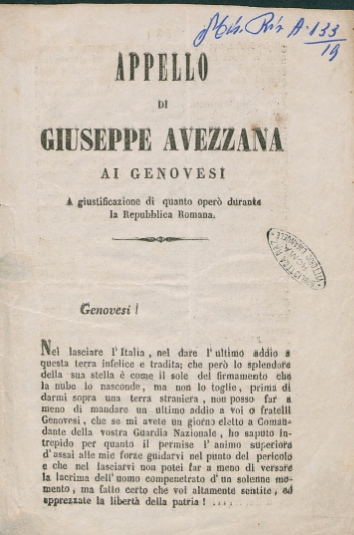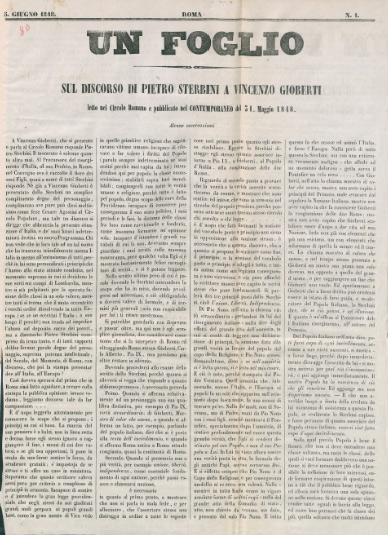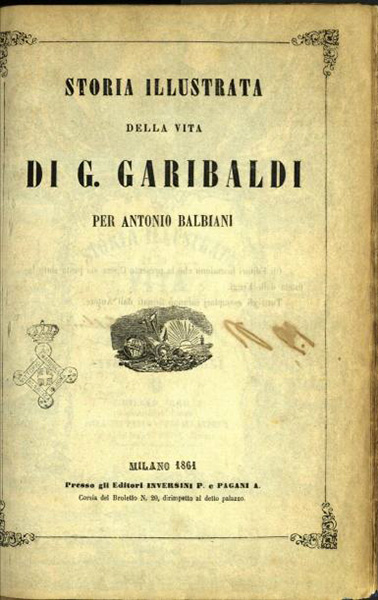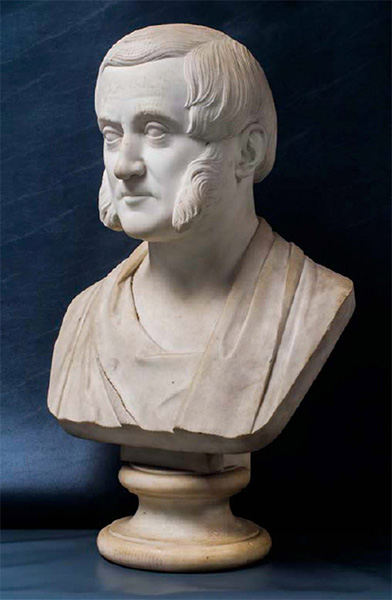3. Conquest

Recognizing the hopelessness of their situation, on June 30 the leaders of the Roman Republic ordered all efforts at defense halted. On July 3 French troops marched into the center of the city while Garibaldi and his ragtag army fled north. As Mazzini and other leaders of the Republic tried to escape, they again turned to Nicholas Brown, who provided American passports for many of them.1Among these was Triumvirate member Aurelio Saffi, who reported on getting an American passport from Brown in a letter to his mother written on July 18, 1849 (Saffi 1899, p. 123). Among the notable documents in the John Hay collection is a July 2 letter to Brown, in French, from Giuseppe Avezzana, the Roman Republic’s Minister of War (himself an American citizen), requesting five American passports. It would be one of the last documents to bear the stamp of the Roman Republic.2In fact, Avezzana had lived in New York from 1834 to the outbreak of the 1848 rev- olutions in Italy (Lerro 1962).
Two days later, Pietro Roselli, military commander of the Roman Republic’s army, sent a plea addressed to the “Citizen Senator” of Rome with a much broader request of Brown along with his English counterpart, John Freeborn. “To ensure the greatest good that one can for all those soldiers who cannot, without danger, return to their homes, I beseech you to immediately send someone to the English and American consuls, for the purpose of getting from them passports to allow them to go to the places in which they can live better, and remain with greater security.”3The letter, on the letterhead of the Comando Generale dell’Armata, Repubblica Romana, and signed by Roselli, dated “Roma 4 Luglio 1849,” is found in the Nicholas Brown papers. That this letter, addressed to Rome’s Senator, ended up in Brown’s papers would suggest that the Senator did indeed send such an emissary to Brown.4The envelope, bearing the stamp of the “Comando Generale dell’Armata,” and addressed “Al Cittadino Senatore di Roma” is found along with the letter in the Nicholas Brown papers.
The John Hay collection also contains two notes from the Countess Cristina Belgiojoso to Nicholas Brown dated July 6, both written in English. One asks for free passage in an American ship for two brothers from an Italian family in Tunis who fought for the Roman Republic and now sought to get back there. The other is especially precious, for it sheds new light on Belgiojoso herself: Her note accompanied some letters which she asked Brown to mail for her. She added archly: “I suppose that General Oudinot would like to peep in my letters, and I wish to escape that.” The address she gave as her return address in these two letters is especially surprising: “Quirinal”—the palace that was the seat of Pius IX until taken over by the revolutionaries. By the time she was writing these letters it had been occupied by the French command.5See Document #5 in the section “SELECTED DOCUMENTS FROM THE NICHOLAS BROWN PAPERS, JOHN HAY LIBRARY, BROWN UNIVERSITY”: Belgiojoso a Brown, 6 luglio 1849.
But the most remarkable letter to be found from Belgiojoso in the John Hay collection is one without date, but likely written between July 4 and July 6, 1849. As is the case with many of the other letters in these archives, Italian historians have apparently been unaware of their existence. She wrote this letter to Brown in Italian:
Mr. Consul,
Knowing the recommendations that General Garibaldi made to you, and trusting in the honor and the principles of the nation that your represent, I place all the wounded of the War of Roman Independence under the protection of those same principles.
Greetings and brotherhood,
Cristina Trivulzio di Belgiojoso 6The document is found in the Nicholas Brown papers.
This message is of interest for many reasons, not least in being the only evidence we have of Brown’s direct relationship with Garibaldi.
Nicholas Brown’s final Roman drama took place early in the evening of July 6 when French troops invaded his residence. The facts are in dispute. In Margaret Fuller’s colorful account, when the French entered, “Mr. Brown, banner in one hand and sword in the other, repelled the assault, and … drove them down stairs. … then he made them an appropriate speech, though in a mixed language of English, French, and Italian. … the crowd vehemently applauded Mr. Brown, who already was much liked for the warm sympathy he had shown the Romans … he then donned his uniform, and went to [French General] Oudinot to make his protest.”7Fuller 1856, p. 416; her entry is for July 8, 1849.

U.S. chargé d’affaires Cass, however, offered a very different account. It was true, he wrote, that twenty French troops invaded Brown’s home, but their action was understandable. When passing Brown’s home, the French soldiers were taunted by Brown’s servants. “From my own knowledge of the conduct of Mr. Brown’s servants,” Cass reported to Washington, “I have not the slightest doubt that their behavior was of the character represented. In the vicinity of the Consulate their rudeness and insolence … have long been notorious.”8Cass to Clayton, July 8, 1849 (Stock 1933, pp. 46-48).
Within hours of this incident, Nicholas Brown packed his bags and with his wife and children boarded a ship bound for Genoa. Yet even this departure proved dramatic, and again prompted a protest from a fellow American diplomat in Italy. Brown landed in Genoa on July 9 along with numerous veterans of the Roman Republic under his protection. Most notable among them was Pietro Sterbini, one of the leaders of the revolt against the pope and widely suspected of being one of those behind the assassination of Pellegrino Rossi. As Sterbini was also persona non grata in the Kingdom of Sardinia, of which Genoa was a part, Brown traveled to the capital, Turin, to get approval for Sterbini and his colleagues to pass safely out of the country. The U.S. consul in Turin, appalled by Brown’s actions, wrote a detailed letter of complaint to Washington:
Mr Brown, our consul at Rome, arrived in Turin with his suite, among whom was the notorious Sterbini, in the character of a domestic servant. Mr Brown has given American passports to members of the political fugitives from Rome on the occasion of the entry of the French army, several of whom arrived in the port of Genoa, but notwithstanding the manifest disposition of this government to accord every proper consideration to the seal of the United States, it could not admit the right of these persons, of more than doubtful character, in all respects, to claim in virtue of it, admission to a residence on Sardinian soil. They were therefore refused admission, notwithstanding their American passports, which should in strictness, never be found in the possession of persons whom they cannot protect. 9Nathaniel Niles to John Clayton, Turin, August 10, 1849, in Marraro 1964, p. 126. Papal secretary of state Cardinal Antonelli himself in late July complained of Brown’s activities in facilitating the escape of many of the leaders of the Roman Republic (Virlogeux 2001).
Yet Brown’s efforts, if unappreciated by the American consul in Turin, did not go unrewarded. Some indication of this is now discoverable in the papers at the John Hay. On arrival in Turin Brown wrote to the prime minister, Massimo d’Azeglio, pleading on behalf of the refugees. D’Azeglio’s reply to Brown is found in these papers:
I presented the memo that Your Lordship addressed to me today to the Council of Ministers. … The Council, in light of the sad position in which many Italian refugees find themselves, has decided to send immediately to Genoa a person charged with providing for the current emergency. I hope that Your Lordship will see in this act testimony of the great sympathy that the unhappy fate of so many Italians has caused us, and will see our sincere desire to do everything for them that circumstances permit. 10See Document #6 in the section “SELECTED DOCUMENTS FROM THE NICHOLAS BROWN PAPERS, JOHN HAY LIBRARY, BROWN UNIVERSITY”: D’Azeglio to Brown, Torino, 12 luglio 1849, Nicholas Brown papers.

Thanks to Nicholas Brown, Pietro Sterbini and his comrades, rather than languishing in the pope’s prisons, or worse, would make their way into foreign exile.
Brown himself made his way to Switzerland. There he belatedly received a remarkable letter, addressed to him in Rome, that was sent on August 3 from Comacchio, written by Carlo Carli, who described himself as the U.S. vice consul there. It told of Garibaldi’s landing on the night of August 2nd/3rd with five or six hundred of his men in a makeshift flotilla of fifteen or twenty small fishing boats and rickety sailboats, as they fled the pursuing Austrian army.11The Carlo Carli letter is in the collection of Nicholas Brown papers and contains a
lengthy description of events. While, miraculously, Garibaldi would escape, his wife Anita would die the next day, and most of his men would soon be either captured or—like the Barnabite monk Ugo Bassi and the popular Roman hero Ciceruacchio and his two sons—summarily executed by Austrian troops.
Although the Roman Republic had fallen, and Brown would not return to Rome, in the following years he continued to stay in touch with and do what he could to support the republican leaders he had befriended in those heady days of 1848-1849. While in Geneva in August of 1849, Brown was angered to learn of a letter that Francisque Corcelle, Tocqueville’s personal envoy to Rome and to the pope, had written to the French government from Rome, which had recently been published in the European press. In it, Corcelle insisted that French troops had never bombarded Rome. Rather, he stated, the French had carefully confined their artillery fire to the city’s wall, aimed at making a breach through which they could enter. Among the documents in Brown’s papers is a draft, in French, of a heated letter he sent to Corcelle: “I have the honor of informing Your Excellency that, as the Consul of the United States of America in Rome, I signed the protest presented to General Oudinot to prevent the continuation of the bombardment of the City of Rome.” As an eyewitness, and with the credibility that came from being an official representative of the U.S. government, Brown sought to undercut the official French narrative of their surgical conquest of the city.12Brown’s draft is dated 18 Août, “Geneve in Switz”, and addressed to l’Ambassadeur de Corcelles. The correct, if somewhat unusual, spelling of the French envoy’s name is Corcelle, but it was commonly spelled with a final “s” as done here by Brown. Nicholas Brown papers.
One of the more curious indications of Brown’s continuing contacts with Mazzini found in the Brown papers is a letter that Mazzini wrote, undoubtedly at Brown’s request, on behalf of Mrs. Brown. Addressed to author George Sand, in Nohant, France, and written by Mazzini in French, it begins: “My friend, Madam Brown, an American, wishes to see you. She is a good and independent woman. She loves our cause. …” Mazzini dates it Geneva, September 9, 1949, revealing that the Risorgimento prophet was then in the same city as Brown, where they presumably were in close touch.13The fact that Mazzini’s letter is addressed to George Sand, in Nohant, is evident from the envelope which is also found in the Nicholas Brown papers. The letter concludes: “votre ami devoué, Joseph Mazzini.”
The Brown papers also contain letters from Mazzini showing his hope in the years immediately following the defeat of the Roman Republic that Brown would continue to help him advance his cause. This Brown did in various ways, including, in 1851, purchasing bonds issued by the “Comitato Nazionale Italiano,” signed by Mazzini, along with, among others, his fellow Triumvir in exile, Aurelio Saffi.14Two such bonds are found in the Nicholas Brown papers, both dated October 1, 1851, one for 25 Franchi and the other for 100 Franchi. The certificates are headed with the words: “God and People … Italy and Rome. Italian National Loan, Aimed solely to hasten Italy’s independence and freedom.”
Brown stayed in Europe another few years, traveling to Nice, Barcelona, Madrid, and Paris. His wife, Caroline Clements Brown, did some travelling on her own, including a trip to Naples where she came to the unwanted attention of the police who suspected her of meeting with radicals there. In 1853 the family finally returned to Rhode Island, where Nicholas Brown quickly returned to form, bitterly battling with family members over his father’s estate. Angered that various family properties had not been left to him, Brown built a large Italianate mansion on 200 waterfront acres near Providence, with lavishly appointed great halls, English hand-painted wallpaper, and a garden stocked with imported plants.

In 1854, a year before moving into his new home, Brown joined the anti-Catholic Know-Nothing party. The party had been founded a decade earlier in response to the mass immigration of Irish fleeing the potato famine.
The Know Nothings claimed that a “Romanist” conspiracy was underway aimed at undermining civil and religious freedom in the United States. It was the patriotic duty of all native Protestants, they argued, to combat it. Two years after Brown joined the party, the Know Nothing governor of Rhode Island chose him to become Lieutenant Governor, a position he would hold only a year, as in 1857 a new governor was elected. It was the only governmental position, aside from his four years as the American consul in Rome, that Nicholas Brown would have.
On both sides of the Atlantic, he cast himself as a defender of American republican ideals against the retrograde powers of the papacy. He died only two years after his brief stint as Lieutenant Governor of Rhode Island, aged sixty-six.15These details are from Sylvia Brown 2017.


